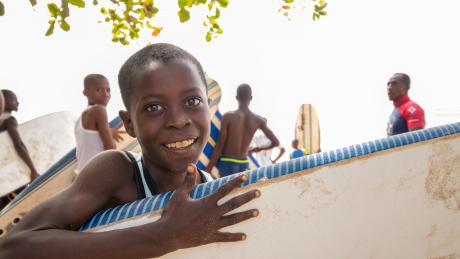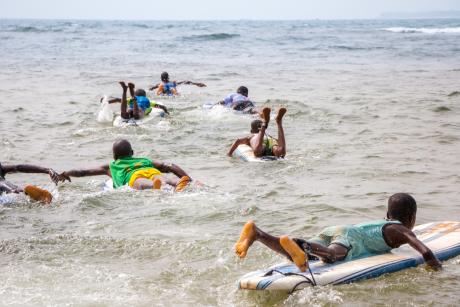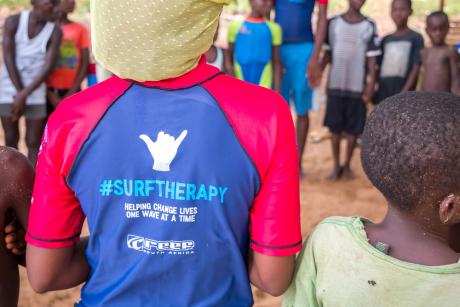
Teaching Liberian kids how to surf is simply a means to a different end for Waves for Change. Sure, surfing can be fun, but the real purpose is to change lives in positive, meaningful ways
The surfing programme mentors kids through swimming and surfing. It gives kids the opportunity to explore the natural beauty of the place they live in, while showing them positive examples of leadership and teaching them how to work together and control their fear, anger and disappointments.
The year-long programme begins with learning how to swim and be safe in the ocean waves and eventually works up to surfing.
MAF partners with Waves for Change by transporting staff to Harper from the capital city of Monrovia. Emmed Ross, their manager in Harper, shares, “Our goal is to get kids from nine years old to 20 in terms of behaviour change, in terms of building free space, building a sense of belonging, and to teach them how to surf on the ocean. It’s important for kids because coming from our background, we’ve been through a lot of problems in the war. Kids are devastated. We’re trying to bring them together to take that negative thinking of their mind…and make them more helpful to society, and the people.”

The other option was a 17 hour car drive, which we just didn’t have the time for.
The Beginning
Tim Conibear founded the organisation Waves for Change in South Africa in 2011 for kids in some of the roughest townships in the eastern Cape, teaching them how to overcome fear and stress, how to deal with the troubles in their lives and give them hope – all through learning the skills of surfing in a year-long programme. It grew from five kids, a car and some surfboards, to 18 coaches and 250 children by 2016. The organisation has won several awards, including the prestigious Laureus Sport for Good.
The Liberian programme took months of preparation via emails. Tim and his partner made their first trip to Liberia in February 2017 to meet with their contacts at Tubman University in Harper where the programme would later be implemented. Harper sits at the southern-most tip of the country on the Atlantic Ocean offering the necessary water, plus a university with students from the Peer Counselling programme that could train as coaches.
“We flew with MAF down to Harper,” Tim describes. “The other option was a 17 hour car drive, which we just didn’t have the time for.” In the rainy season that same drive can take days as the road turns to a muddy mess, often becoming impassable.

Breathe
The program is divided into 10 sections, starting with immersion – learning to not fear the water – followed by basic swimming skills and working in baby steps up to surfing: get on, paddle, stand up. Throughout the process, the kids learn to manage their pain, anger, and disappointments. Sit on the surfboard – breathe in, breathe out. Lift your arms and think of a happy time – breathe in, breath out. Find an object on the beach and think of a good time. When anger and frustrations come, hold the object and remember the good.
“The mission of this programme is to provide a safe space for the kids, and provide caring adults for those kids that are at risk in the community,” one instructor describes. “We find ourselves in a community where there’s a lot of domestic violence at youth, against children…This programme gives us the opportunity to be with these kids, to help build them up, to build their self-esteem. It helps us to listen to how they feel, and to let them know that they are important, that somebody is there for them, that they have people who care for them.”
Liberia is the first country the programme has expanded to outside of South Africa. Tim felt Liberia would be a good place to test the programme outside of his own country – a place traumatised by war and the recent Ebola crisis. “We were really interested to come to Liberia because it’s such a challenging place to work. We want to pressure-test the model and see if it can be done here, and then basically it can be done anywhere with a coastline.”